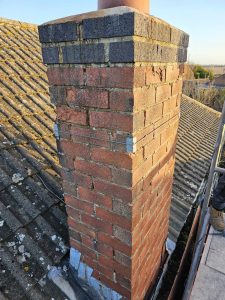 Weathered and Crumbling Mortar
Weathered and Crumbling Mortar
One of the most obvious signs that your brickwork requires repointing is the condition of the mortar. Over time, exposure to rain, wind, and temperature fluctuations can cause the mortar to weather and deteriorate. Inspect your brickwork for mortar that is crumbling, eroding, or has become excessively porous. If you can easily scrape mortar away with a tool or your fingers, it’s a clear indication that repointing is necessary.
 Gaps and Voids
Gaps and Voids
Gaps and voids between the bricks can develop as the mortar wears away. These gaps not only detract from the appearance of your brickwork but also compromise its structural stability. Examine the joints between bricks for any noticeable openings or spaces. If you can see daylight or if a coin can fit into the gap, it’s time to consider repointing.

 Staining and Discoloration
Staining and Discoloration
Stains and discoloration on the surface of your brickwork can also be indicative of mortar deterioration. As the mortar weakens, it can allow moisture to penetrate, resulting in unsightly stains and efflorescence, which is the white, powdery deposit that forms on the brick surface due to mineral salts leaching from the mortar. Stains and discoloration are not only aesthetically unappealing but also suggest that the structural integrity of your brickwork may be compromised.
 Sagging or Bulging Bricks
Sagging or Bulging Bricks
If you notice bricks that are sagging, bulging, or appear to be pulling away from the structure, this is a serious sign of mortar degradation. In such cases, the mortar can no longer provide adequate support, and the bricks may be at risk of collapsing. Immediate repointing is essential to prevent further damage and ensure the safety of your structure.
 Water Infiltration and Interior Damage
Water Infiltration and Interior Damage
One of the most critical reasons to monitor your brickwork for repointing needs is the potential for water infiltration. Damaged mortar joints can allow water to seep into your walls, leading to a host of problems, including interior water damage, mold growth, and rot. If you notice water stains or signs of moisture inside your home near exterior brick walls, it’s a clear indication that your brickwork needs attention.

 Age of the Brickwork
Age of the Brickwork
The age of your brickwork can also be a significant factor in determining whether repointing is required. Mortar joints have a finite lifespan, typically lasting 20-30 years. If your brickwork is approaching or has surpassed this age range, it’s wise to have it inspected by a professional mason. Even if there are no obvious signs of deterioration, proactive repointing can extend the life of your brickwork and prevent more extensive damage.
 Conclusion
Conclusion
Maintaining the integrity and appearance of your brickwork is essential for the long-term health and beauty of your property. Regularly inspecting your brickwork for signs of mortar deterioration, such as weathered mortar, gaps, stains, sagging bricks, water infiltration, and its age, is crucial in identifying the need for repointing. When in doubt, consult with a professional mason who can assess the condition of your brickwork and recommend the appropriate course of action. By addressing repointing needs promptly, you can preserve the structural strength and visual appeal of your brickwork for years to come.

